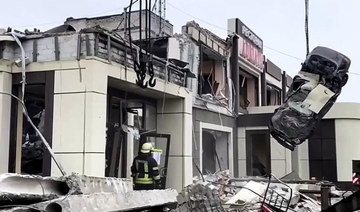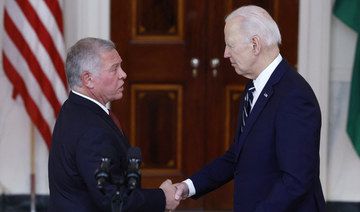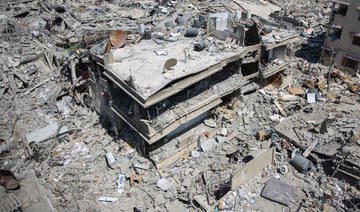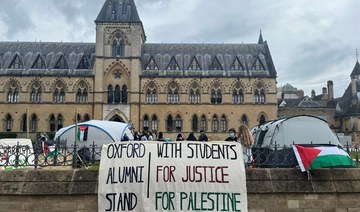KYIV: Ukrainian President Volodymyr Zelensky replaced his top army general on Thursday in what amounts to a major shake-up of the country’s war strategy as the conflict with Russia grinds into its third year and Ukraine grapples with shortages of ammunition and personnel.
In a post on X, Zelensky said he thanked Gen. Valerii Zaluzhnyi — a military leader popular with troops and the general public — for his two years of service as commander-in-chief. “The time for such a renewal is now,” Zelensky said.
Zelensky appointed Сol. Gen. Oleksandr Syrskyi, the commander of Ukraine’s ground forces, to lead the army. Syrskyi, 58, has since 2013 been involved in the Ukrainian army’s effort to adopt NATO standards.
Zaluzhnyi, in a Telegram message, did not announce he had stepped down but said he accepted that “everyone must change and adapt to new realities” and agreed that there is a “need to change approaches and strategy” in the war.
The statement followed days of speculation spurred by local media reports that Zelensky would sack Zaluzhnyi in the most far-reaching shake-up of the top military brass since Russia’s full-scale invasion of Ukraine on Feb. 24 2022.
Ukraine’s struggles with ammunition and personnel come on the heels of a failed summer counteroffensive last year.
Zaluzhnyi was highly regarded by his troops and by foreign military officials. Some analysts warned that his exit could bring unwelcome disruption, potentially driving a wedge between the Ukrainian army and politicians, and fueling uncertainty among Kyiv’s Western allies.
There has been little change in positions along the 1,500-kilometer (900-mile) front line over the winter, though the Kremlin’s forces have kept up their attacks at certain points. Faced with a shortfall in anticipated supplies of Western weaponry, Ukraine has been digging defenses, while Moscow has put its economy on a war footing to give its military more muscle.
Rifts within Ukraine’s top leadership burst into the open recently with swirling rumors starting on Jan. 29 that Zaluzhnyi would be dismissed. Zelensky’s office and the Defense Ministry denied the rumors, but the reports fueled expectations he was on his way out.
Strains had appeared between Zaluzhnyi and Zelensky — arguably the two most prominent figures in Ukraine’s fight — after the much-anticipated counteroffensive failed to meet its goal of penetrating Russia’s deep defenses. Kyiv’s Western allies had poured billions of dollars’ worth of military hardware into Ukraine to help it succeed.
Months later, amid signs of war fatigue in the West, Zaluzhnyi described the conflict as being at a “stalemate,” just when Zelensky was arguing in foreign capitals that Ukraine’s new weaponry had been vital.
Zelensky said at the end of last year that he had turned down the military’s request to mobilize up to 500,000 people, demanding more details about how it would be paid for.
Born into a family of Soviet servicemen, Zaluzhnyi is credited with modernizing the Ukrainian army along NATO lines. He took charge seven months before Russia’s full-scale invasion.
Widely regarded in the West as an ambitious and astute battlefield commander, he has had a reputation for modesty in Ukraine.
Zaluzhnyi earned broad public support after the successful defense of Kyiv in the early days of the war, followed by a triumphant counteroffensive in the Kharkiv region and the liberation of Kherson. His courage and defiance of Russia’s ambitions were renowned, and he became a symbol of resilience and national unity.
“We are on our land and we will not give it up,” Zaluzhnyi said on the first day of the war.
Despite his popularity, Zaluzhnyi shied from the spotlight, deferring that role to Zelensky. He made limited public appearances and rarely gave interviews.
Retired Australian Maj. Gen. Mick Ryan, a fellow of the Center for Strategic and International Studies think tank in Washington, described Zaluzhnyi as “a charismatic and popular military leader” who would be hard to replace.
His replacement will have to build personal relationships with US and NATO military chiefs while the perception of government instability “is a real danger area for” Zelensky, Ryan wrote recently in an article posted online.
Meanwhile, Ukrainian forces claimed to have shot down a Russian attack helicopter in eastern Ukraine near the city of Avdiivka, where soldiers are fighting from street to street as Russia’s army steps up its four-month campaign to surround Kyiv’s defending troops.
Ukrainian soldiers used a portable anti-aircraft missile to take down the Ka-52 Alligator attack helicopter, one of the Russian air force’s deadliest weapons, according to Oleksandr Tarnavskyi, the commander of Ukrainian units fighting on the southeastern front line.
Avdiivka has become “a primary focus” of Moscow’s forces, the UK Defense Ministry said in an assessment Thursday.
Street-to-street combat is taking place in the city as Ukrainian troops seek to keep open their main supply route amid intense bombardment, the ministry said on X, formerly known as Twitter.
The General Staff of Ukraine’s armed forces reported Thursday that its troops had fended off 40 enemy assaults around Avdiivka over the previous 24 hours. That is roughly double the number of daily Russian assaults at other points along the front line.
Russia’s Pravda newspaper reported Thursday that the Russian army was attempting to cut a key logistics supply route for Ukraine in the village of Lastochkyne, about 6 kilometers (4 miles) west of Avdiivka.
The Russian military has used electronic warfare to take out the Starlink communications system which Ukrainian troops use to communicate, Pravda said.
Ukraine has built multiple defenses in Avdiivka, complete with concrete fortifications and a network of tunnels. Despite massive losses of personnel and equipment, Russian troops have slowly advanced since October.
The fight has evolved into a gruesome effort for both sides. It has been compared to the nine months of fighting for Bakhmut, the Ukraine war’s longest and bloodiest battle. It ended with Russia capturing the bombed-out, deserted city last May in what Moscow hailed as a major triumph.
Both Bakhmut and Avdiivka are located in Ukraine’s Donetsk region. Moscow-backed rebels seized part of the region in 2014 and Russia illegally annexed all of it in 2022 with three other Ukrainian regions.
Russia wants to capture the entire Donetsk region, where it currently holds just over half of the territory.
Ukraine’s president appoints new army leader at pivotal moment in war with Russia
https://arab.news/5dqp7
Ukraine’s president appoints new army leader at pivotal moment in war with Russia
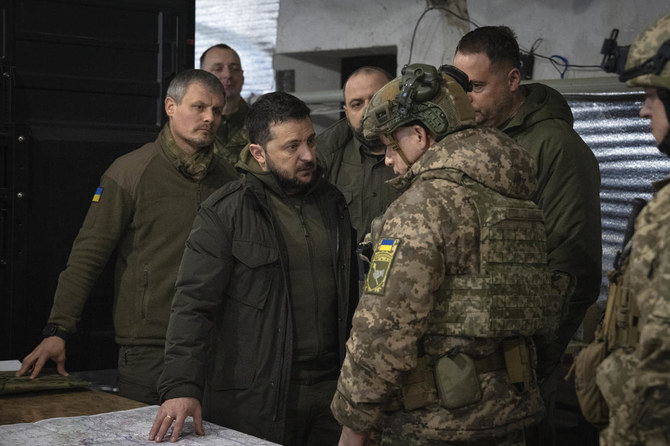
- Zelensky appointed Сol. Gen. Oleksandr Syrskyi, the commander of Ukraine’s ground forces, to lead the army
- Ukraine’s struggles with ammunition and personnel come on the heels of a failed summer counteroffensive last year
UK military personnel’s data accessed in hack, BBC reports

- MPs could be informed about the development in the Commons on Tuesday
Some personal information in a payroll system used by Britain’s defense department has been accessed in a data breach, the BBC reported on Monday.
The system was managed by an external contractor and no operational Ministry of Defense data was obtained, the broadcaster said, adding that the department took the system off-line immediately.
Information like names and bank details of current and some former members of the Royal Navy, Army and Air Force was compromised, according to the report.
The Ministry of Defense did not immediately respond to a Reuters’ request for comment outside working hours.
MPs could be informed about the development in the Commons on Tuesday, the report added.
Columbia University cancels main commencement after weeks of pro-Palestinian protests

- Israel has killed more than 34,600 Palestinians, about two-thirds of them women and children, according to the Health Ministry in the Hamas-ruled territory
- Similar encampments sprouted up elsewhere as universities struggled with where to draw the line between allowing free expression while maintaining safe and inclusive campuses
NEW YORK: Columbia University canceled its large university-wide commencement ceremony Monday following weeks of pro-Palestinian protests that have roiled its campus and others across the US, but said students will still be able to celebrate at a series of smaller, school-based ceremonies this week and next.
The decision comes as universities around the country wrangle with how to handle commencements for students whose high school graduations were derailed by COVID-19 in 2020. Another campus shaken by protests, Emory University, announced Monday that it would move its commencement from its Atlanta campus to a suburban arena. Others, including the University of Michigan, Indiana University and Northeastern, have pulled off ceremonies with few disruptions.
Columbia’s decision to cancel its main ceremonies scheduled for May 15 saves its president, Minouche Shafik, from having to deliver a commencement address in the same part of campus where police dismantled a protest encampment last week. The Ivy League school in upper Manhattan said it made the decision after discussions with students.
“Our students emphasized that these smaller-scale, school-based celebrations are most meaningful to them and their families,” officials said.
Most of the ceremonies that had been scheduled for the south lawn of the main campus, where encampments were taken down last week, will take place about 5 miles (8 kilometers) north at Columbia’s sports complex, officials said.
Speakers at some of Columbia’s still-scheduled graduation ceremonies include Pulitzer Prize-winning playwright James Ijames and Dr. Monica Bertagnolli, director of the National Institutes of Health.
Columbia had already canceled in-person classes. More than 200 pro-Palestinian demonstrators who had camped out on Columbia’s green or occupied an academic building were arrested in recent weeks.
Similar encampments sprouted up elsewhere as universities struggled with where to draw the line between allowing free expression while maintaining safe and inclusive campuses.
The University of Southern California earlier canceled its main graduation ceremony. Students abandoned their camp at USC on Sunday after being surrounded by police and threatened with arrest.
Other universities have held graduation ceremonies with beefed-up security. The University of Michigan’s ceremony was interrupted by chanting a few times Saturday. In Boston on Sunday, some students waved small Palestinian or Israeli flags at Northeastern University’s commencement in Fenway Park.
Emory’s ceremonies scheduled for May 13 will be held at the GasSouth Arena and Convocation Center in Duluth, almost 20 miles (30 kilometers) northeast of the university’s Atlanta campus, President Gregory Fenves said in an open letter.
“Please know that this decision was not taken lightly,” Fenves wrote. “It was made in close consultation with the Emory Police Department, security advisers and other agencies — each of which advised against holding commencement events on our campuses.”
The 16,000-student university is one of many that has seen repeated protests stemming from the conflict that started Oct. 7 when Hamas militants attacked southern Israel, killing about 1,200 people, mostly civilians, and taking roughly 250 hostages. Student protesters are calling on their schools to divest from companies that do business with Israel or otherwise contribute to the war effort.
Vowing to destroy Hamas, Israel launched an offensive in Gaza that has killed more than 34,500 Palestinians, about two-thirds of them women and children, according to the Health Ministry in the Hamas-ruled territory. Israeli strikes have devastated the enclave and displaced most of its inhabitants.
Hamas on Monday announced its acceptance of an Egyptian-Qatari ceasefire proposal, but Israel said the deal did not meet its “core demands” and that it was pushing ahead with an assault on the southern Gaza town of Rafah.
“Ceasefires are temporary,” said Selina Al-Shihabi, a Georgetown University sophomore who was taking part in a protest at George Washington. “There can be a ceasefire, but the US government will continue to arm the Israeli military. We plan to be here until the university divests or until they drag us out of here.”
Also Monday, the University of California, Los Angeles, alerted students that all classes were moving online due to ongoing disruptions following the dismantling of a pro-Palestinian encampment last week. The university police force reported 44 arrests but there were no specific details, UCLA spokesperson Eddie North-Hager said in an email to The Associated Press.
At the University of California, San Diego, police cleared a pro-Palestinian encampment and arrested more than 64 people, The San Diego Union-Tribune reported.
Schools are trying various tactics from appeasement to threats of disciplinary action to get protesters to take down encampments or move to campus areas where demonstrations would be less intrusive.
The School of the Art Institute of Chicago said in a Facebook post Sunday that it offered protesters “amnesty from academic sanction and trespassing charges” if they moved.
“Many protesters left the premises of their own accord after being notified by the police that they were trespassing and subject to arrest,” the school said. “Those that remained were arrested after multiple warnings to leave, including some of whom we recognized as SAIC students.”
A group of faculty and staff members at University of North Carolina at Chapel Hill asked the administration for amnesty for any students who were arrested and suspended during recent protests. UNC Faculty and Staff for Justice in Palestine said in a media advisory that it would deliver a letter on behalf of more than 500 faculty who support the student activists.
Other universities took a different approach.
Harvard University’s interim president, Alan Garber, warned student’s that those participating in a pro-Palestinian encampment in Harvard Yard could face “involuntary leave.” That means they may would not be allowed on campus, could lose their student housing and may not be able to take exams, Garber said.
At the Massachusetts Institute of Technology, police restricted access to an encampment after a school deadline for them to leave had passed. About 200 protesters gathered outside the camp, chanting, “MIT can’t you see? Palestine will be free” and other slogans.
Russia says it takes control of two more settlements in eastern Ukraine
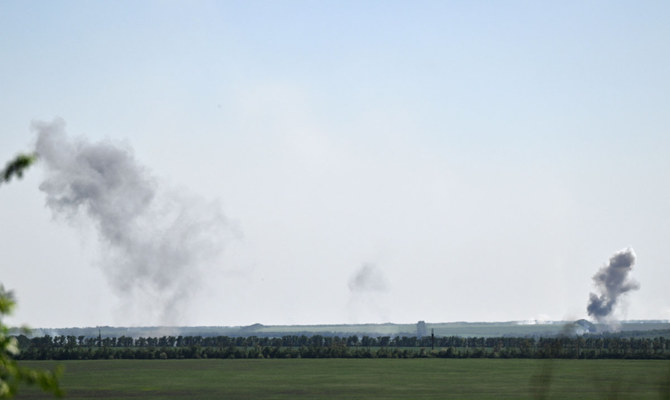
- Russia has made slow but steady advances since taking Avdiivka in February, with a string of villages in the area falling to Moscow’s forces
MOSCOW: Russian forces have taken control of the settlements of Soloviove in Ukraine’s eastern Donetsk region and Kotliarivka further north in the Kharkiv region, the defense ministry said on Monday.
Ukraine’s military made no mention of either locality in its evening General Staff report. Kharkiv Regional Governor Oleh Syniehubov said on Monday that Kotliarivka, located near the town of Kupiansk, was one of several locations to come under Russian shelling.
But Ukrainian bloggers appeared to acknowledge that both villages were in Russian hands.
DeepState, a popular forum on the war, noted on Saturday that Kotliarivka had been captured by Russian forces and on Sunday said the neighboring village of Kyslivka was also in Russian hands.
DeepState reported that Soloviove, northwest of the Russian-held town of Avdiivka, had been taken by Russian forces last week.
Russia has made slow but steady advances since taking Avdiivka in February, with a string of villages in the area falling to Moscow’s forces.
UNICEF warns 600,000 children face ‘catastrophe’ in Rafah
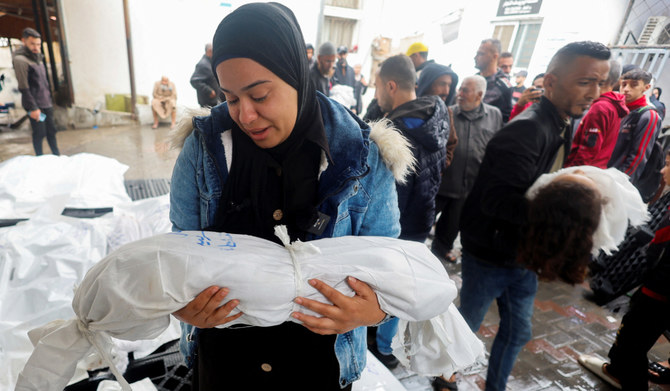
- Calling again for a ceasefire and safe access for humanitarian organizations, the agency highlighted there are some 78,000 infants under age two sheltering in the city, along with 175,000 children under five who are affected by infectious disease
- Israel has killed more than 34,000 Palestinians in Gaza, mostly women and children, according to the health ministry in the Hamas-run territory
NEW YORK: Some 600,000 children packed into Gaza’s Rafah city face “further catastrophe,” UNICEF warned on Monday, urging against their forced relocation after Israel ordered an evacuation ahead of its long-threatened ground invasion.
“Given the high concentration of children in Rafah ... UNICEF is warning of a further catastrophe for children, with military operations resulting in very high civilian casualties and the few remaining basic services and infrastructure they need to survive being totally destroyed,” the UN children’s agency said in a statement.
It said Gaza’s youth were already “on the edge of survival,” with many in Rafah — where the agency said the population has soared to 1.2 million people, half of them children — already displaced multiple times and with nowhere else to go.
“More than 200 days of war have taken an unimaginable toll on the lives of children,” said UNICEF Executive Director Catherine Russell.
“Rafah is now a city of children, who have nowhere safe to go in Gaza,” she said, warning that a large-scale military operation by Israel would bring “chaos and panic, and at a time where (children’s) physical and mental states are already weakened.”
UNICEF estimates that Rafah’s population has swelled to nearly five times its normal figure of 250,000 residents.
Calling again for a ceasefire and safe access for humanitarian organizations, the agency highlighted there are some 78,000 infants under age two sheltering in the city, along with 175,000 children under five who are affected by infectious disease.
Gaza’s bloodiest-ever war began following Hamas’s unprecedented Oct. 7 attack on Israel.
Israel has conducted a retaliatory offensive that has killed at least 34,735 people in Gaza, according to the Hamas-run
territory’s Health Ministry.
Of that toll, more than 14,000 are children, the ministry has said.
Israeli Prime Minister Benjamin Netanyahu has vowed to send ground troops into Rafah regardless of any truce, despite concerns from the US, other countries, and aid groups.
Hamas official Izzat Al-Rashiq said in a statement that any Israeli operation in Rafah would put the truce talks in jeopardy.
Senior Hamas official Sami Abu Zuhri said the evacuation order was a “dangerous escalation” that would have consequences.
“The US administration, alongside the occupation, bears responsibility for this terrorism,” the official said.
Hamas said later in a statement that any offensive in Rafah would not be a “picnic” for Israeli forces and said it was fully prepared to defend Palestinians there.
Aid agencies have warned that the evacuation order will lead to an even worse humanitarian disaster in the crowded coastal enclave of 2.3 million people reeling from seven months of war.
“Forcing 1 million displaced Palestinians from Rafah to evacuate without a safe destination is not only unlawful but would lead to catastrophic consequences,” British charity ActionAid said.
Nick Maynard, a British surgeon trying to leave Gaza on Monday, said in a voice message from the Gaza side of the Rafah crossing into Egypt: “Two huge bombs have just gone off immediately outside the crossing. There’s a lot of gunfire as well about 100 meters from us. We are very unclear whether we will get out.”
“Driving through Rafah, the tension was palpable with people evacuating as rapidly as they could.”
Witnesses said the areas in and around Rafah where Israel wants to move people are already crowded with little room for more tents.
“The biggest genocide, the biggest catastrophe, will take place in Rafah. I call on the whole Arab world to interfere for a ceasefire — let them interfere and save us from what we are in,” said Aminah Adwan, a displaced Palestinian.
Israel has been threatening to launch incursions in Rafah, which it says harbors thousands of Hamas fighters and potentially dozens of hostages.
Victory is impossible without taking Rafah, it says.
New York’s Columbia University cancels graduation ceremony as students remain defiant

- Pro-Palestinian protests put paid to event planned for May 15
NEW YORK: New York’s prestigious Columbia University has announced that it is canceling its main graduation ceremony, scheduled for next week, because of ongoing pro-Palestinian protests.
The announcement on Monday is the latest development in a movement that began nearly three weeks ago at Columbia and has swept college campuses nationwide.
The graduation ceremony had been scheduled for May 15 on the south lawn of the Manhattan campus, where protest encampments had been based before authorities dismantled them last week.
The Ivy League institution said it would “forego the university-wide ceremony” and hold a series of smaller events instead.
“We are determined to give our students the celebration they deserve, and that they want,” Columbia announced, saying “smaller-scale, school-based celebrations are most meaningful to them and their families.”
The university added: “We will focus our resources on those school ceremonies and on keeping them safe, respectful, and running smoothly. A great deal of effort is already underway to reach that goal.”
Students across the US have protested and set up tents at dozens of universities to register their opposition to the war in Gaza, while calling on President Joe Biden to do more to stop the bloodshed.
They have also demanded their institutions cease supporting companies that support Israel’s government.
Maya James, a psychology student at Columbia, told Arab News: “Seeing the university’s really insane response to student protests has brought so many people together, because I feel like most people on this campus can agree, including faculty, that students should not be penalized for expressing their First Amendment rights to protest, to petition, to do all of these things we’ve been encouraged to do for so long.”
She called on the university to give amnesty to students who had been suspended for expressing their First Amendment rights, which protect freedom of speech, the press, assembly, and the right to petition.
James also called on the university to disclose its investments because as “of right now there’s no visibility for us students to be able to know what the university is expected to do.”
She described the “vibes” at the protest sites as “absolutely remarkable,” with cultural and educational programs being offered and all kinds of activities being held.
She said the demonstrations were a continuation of Columbia’s long tradition of protest which began in the 1960s with its opposition to the involvement of the US in the Vietnam War.
James said it was “incredible” to see the solidarity for the Palestinian cause spread in campuses across the US, and people pushing to ensure “that we do indeed see a free Palestine within our lifetime and that our universities are no longer complicit in the genocide.”
Demonstrators have gathered on at least 40 US university campuses since April 17, often erecting tent camps to protest against the soaring death toll in the Gaza Strip. Nearly 2,000 people have been detained, according to the US media.
Police officers have forcibly ended several student sit-ins in recent days, including one at New York University at the request of its administrators.
Demonstrators had barricaded themselves inside Columbia, the epicenter of student protests in New York, and some complained about police brutality when officers cleared the faculty.
(With Agencies)





